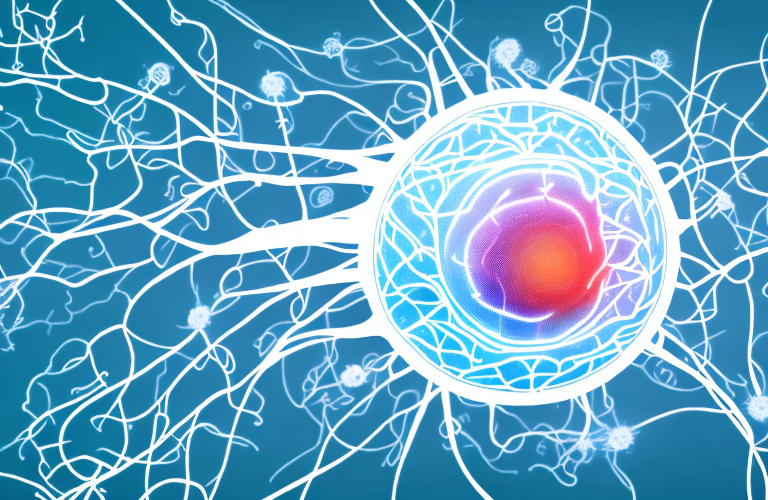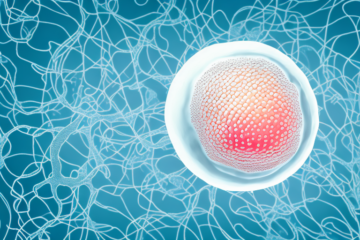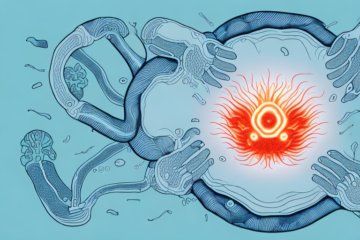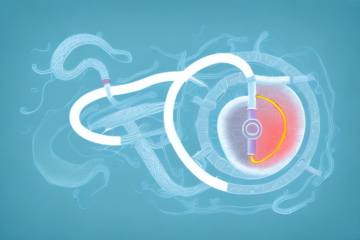Gamma-aminobutyric acid (GABA) is an important neurotransmitter that plays a crucial role in the functioning of our nervous system. In this article, we will take a comprehensive look at what GABA is and how it influences various aspects of our health. From managing anxiety, stress, and depression to promoting better sleep and treating neurological disorders, we will explore the different ways in which GABA impacts our overall well-being.
What is GABA and how does it work in the body?
GABA, a naturally occurring molecule, is an inhibitory neurotransmitter that helps to calm brain activity and reduce excitability in our nervous system. It is synthesized from glutamic acid, an amino acid that plays an important role in brain function. GABA receptors are located throughout the brain and spinal cord and are responsible for regulating various physical processes, including muscle tone, heart rate, and hormonal regulation.
Research has shown that GABA plays a crucial role in promoting relaxation and reducing anxiety. It is often used as a natural supplement to help individuals with anxiety disorders, insomnia, and other conditions related to stress and tension. GABA supplements are also commonly used by athletes to help reduce muscle fatigue and improve exercise performance.
However, it is important to note that the effectiveness of GABA supplements is still a topic of debate among researchers. Some studies have shown positive results, while others have found no significant effects. It is always recommended to consult with a healthcare professional before taking any supplements or making changes to your diet or medication regimen.
The role of GABA in managing anxiety and stress
GABA plays a crucial role in managing anxiety and stress levels in the body. It acts as a natural sedative, helping to calm overactive neurons in our brain. The more GABA present in our system, the less likely we are to feel anxious or stressed. One of the ways GABA helps to reduce anxiety is by blocking certain neurotransmitters that cause excitability in the brain. Additionally, GABA regulates the release of cortisol, a stress hormone that can cause negative effects on our health when levels are high for extended periods.
Research has shown that low levels of GABA in the brain can lead to increased anxiety and stress. This is why some medications used to treat anxiety and depression work by increasing GABA levels in the brain. However, it is important to note that relying solely on medication to increase GABA levels may not be the most effective solution. Lifestyle changes such as exercise, meditation, and a healthy diet can also help to naturally boost GABA levels in the body and reduce anxiety and stress.
How GABA affects sleep and its potential benefits for insomnia
GABA also has a significant impact on our sleep patterns. It helps to reduce brain activity and promote relaxation, leading to better quality sleep. People with a deficiency in GABA often have difficulty falling asleep and may wake up frequently during the night. Several studies have shown that increasing GABA levels through supplementation or lifestyle changes can improve sleep quality and reduce symptoms of insomnia.
In addition to its impact on sleep, GABA has also been found to have potential benefits for other areas of health. For example, it may help to reduce anxiety and improve mood by regulating neurotransmitters in the brain. Some studies have also suggested that GABA could have a positive effect on blood pressure and cardiovascular health.
However, it is important to note that more research is needed to fully understand the potential benefits of GABA supplementation. It is also important to speak with a healthcare professional before starting any new supplement regimen, as GABA may interact with certain medications or have side effects in some individuals.
The relationship between GABA and depression
Studies have shown that GABA levels are often lower in people with depression. Low GABA levels can cause an increase in excitatory neurotransmitters, leading to a dysregulation of mood and behavior. GABA supplements and lifestyle changes have been explored as potential treatments for depression. However, more research is needed to understand the relationship between GABA and mental health fully.
Recent studies have also suggested that GABA may play a role in the development of anxiety disorders. Some researchers believe that low GABA levels may contribute to the development of anxiety symptoms, such as excessive worry and fear. This has led to the exploration of GABA-targeting medications as potential treatments for anxiety disorders. However, more research is needed to fully understand the relationship between GABA and anxiety.
How GABA deficiency can lead to various health conditions
Low GABA levels have been linked to several health conditions, including epilepsy, anxiety, depression, and Parkinson’s disease. People with a deficiency in GABA may also experience symptoms like headaches, dizziness, and insomnia, making it more important to maintain optimal GABA levels in the body.
Research has also shown that GABA deficiency may contribute to the development of addiction and substance abuse disorders. This is because GABA plays a crucial role in regulating the brain’s reward system, which is responsible for feelings of pleasure and motivation. When GABA levels are low, individuals may be more susceptible to seeking out substances or behaviors that provide a temporary boost in dopamine, leading to addiction.
Natural ways to increase GABA levels in the body
There are several natural ways to increase GABA levels in the body, including exercise, meditation, and yoga. Additionally, incorporating foods that contain GABA, like brown rice, nuts, and soybeans, in your diet can help maintain healthy GABA levels.
Another natural way to increase GABA levels in the body is by getting enough sleep. Lack of sleep can lead to decreased GABA levels, which can cause anxiety and other mood disorders. It is recommended to get at least 7-8 hours of sleep per night to maintain healthy GABA levels.
The use of GABA supplements: benefits, risks, and side effects
GABA supplements are often used to increase GABA levels in the body. While some studies have shown that it can be beneficial for improving sleep and reducing anxiety, taking GABA supplements should be done with caution. Some people may experience side effects, including dizziness, headaches, and stomach upset. Additionally, people taking medication or with a history of medical conditions should consult with a healthcare professional beforehand.
It is important to note that the effectiveness of GABA supplements is still being studied and debated in the scientific community. Some experts argue that GABA supplements may not actually increase GABA levels in the brain due to the molecule’s inability to cross the blood-brain barrier. Therefore, it is important to do your own research and speak with a healthcare professional before deciding to take GABA supplements.
The difference between synthetic and natural GABA supplements
Synthetic GABA supplements are created in a laboratory and may be less effective at increasing GABA levels in the body than natural forms. Natural GABA supplements, like those derived from fermented foods, are more bioavailable and may be better at increasing GABA levels.
It is important to note that while natural GABA supplements may be more effective, they can also be more expensive than synthetic options. Additionally, some people may have allergies or sensitivities to certain fermented foods that contain GABA, making synthetic supplements a better option for them. It is always recommended to consult with a healthcare professional before starting any new supplement regimen.
The potential of GABA as a treatment for neurological disorders such as epilepsy and Parkinson’s disease
GABA has been explored as a potential treatment for neurological disorders like epilepsy and Parkinson’s disease. It has been shown to reduce seizures and improve symptoms such as tremors in people with Parkinson’s disease. However, more research is necessary to fully understand its potential as a therapeutic tool for these conditions.
Recent studies have also suggested that GABA may have a role in the treatment of anxiety and depression. GABA receptors are found in areas of the brain that are involved in regulating mood and emotions. Some researchers believe that increasing GABA levels in these areas may help to alleviate symptoms of anxiety and depression.
While GABA shows promise as a potential treatment for neurological and mental health disorders, there are still many unanswered questions about its safety and effectiveness. It is important for further research to be conducted to fully understand the potential benefits and risks of using GABA as a therapeutic tool.
Research on the effectiveness of GABA for ADHD symptoms
Studies have shown that increasing GABA levels may have a positive effect on attention and focus in people with ADHD. However, more research is needed to confirm these findings and understand the mechanism behind GABA and its impact on ADHD symptoms.
One study conducted in 2018 found that GABA supplementation improved cognitive performance and reduced hyperactivity in children with ADHD. The study also reported no adverse effects from the GABA supplementation. However, the sample size was small and further research is needed to determine the long-term effects of GABA supplementation on ADHD symptoms.
Another study published in 2020 investigated the effects of GABA on adults with ADHD. The study found that GABA supplementation improved attention and reduced impulsivity in adults with ADHD. However, the study was also limited by a small sample size and further research is needed to confirm these findings.
Precautions to take before using GABA supplements
Before taking GABA supplements, it is important to consult with a healthcare professional, especially if you are taking medication or have a history of medical conditions. Additionally, it is essential to take the recommended dose and not exceed it to avoid adverse side effects. Pregnant or breastfeeding women should avoid the use of GABA supplements.
It is also important to note that GABA supplements may interact with certain medications, such as benzodiazepines and antidepressants. Therefore, it is crucial to inform your healthcare provider of all the medications you are taking before starting GABA supplements. Furthermore, individuals with kidney or liver disease should use GABA supplements with caution, as these organs are responsible for metabolizing the supplement. It is recommended to start with a low dose and gradually increase it to assess tolerance and effectiveness.
Foods that naturally contain or boost GABA levels
Several foods contain or boost GABA levels in the body, including brown rice, nuts, and soybeans. L-theanine, an amino acid found in green tea, has also been shown to increase GABA levels in the brain. Incorporating these foods in your diet can help maintain healthy GABA levels in the body.
In addition to these foods, certain herbs and spices have also been found to have GABA-boosting properties. For example, passionflower, valerian root, and chamomile have all been shown to increase GABA levels in the brain, leading to feelings of relaxation and calmness. These herbs can be consumed as teas or taken in supplement form.
The role of a healthy lifestyle in maintaining optimal levels of GABA in the body
Maintaining a healthy lifestyle, including getting regular exercise, practicing stress-reducing techniques like meditation and yoga, and eating a balanced diet, can all contribute to healthy GABA levels in the body. Alcohol and caffeine consumption should be limited, as they can lower GABA levels in the body.
In addition to lifestyle factors, certain supplements and medications may also help to maintain healthy GABA levels in the body. For example, some studies have shown that taking magnesium supplements can increase GABA levels and improve symptoms of anxiety. However, it is important to consult with a healthcare professional before starting any new supplements or medications.
Conclusion: Understanding the importance of balanced levels of GABA for overall health and well-being
Overall, GABA plays a significant role in managing anxiety and stress, regulating sleep patterns, and maintaining optimal neurological function in the body. While supplements may be helpful in increasing GABA levels, incorporating a healthy lifestyle that includes stress-reducing behaviors can help maintain balanced and healthy GABA levels in the body. Consult with a healthcare professional before taking any supplements or making significant lifestyle changes to maintain optimal health and well-being.
In addition to managing anxiety and stress, GABA has also been linked to improving mood and reducing symptoms of depression. Studies have shown that individuals with lower levels of GABA are more likely to experience symptoms of depression and anxiety. Therefore, maintaining balanced levels of GABA in the body can have a positive impact on mental health and well-being.
Furthermore, GABA has been found to have potential benefits for individuals with certain medical conditions, such as epilepsy and chronic pain. Research has shown that GABA can help reduce seizures in individuals with epilepsy and alleviate chronic pain symptoms. However, it is important to note that more research is needed in these areas to fully understand the potential benefits of GABA supplementation for these conditions.










